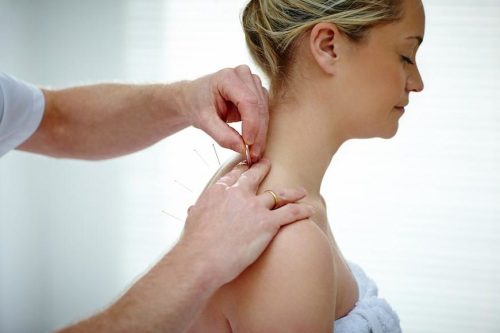I decided to try acupuncture for the first time last year to relieve some tension in my back. When I get stressed, I carry it in my neck and shoulders like most people—but I also have scoliosis, so the strain on my back gets even more intense.
My first treatment was a spiritual experience. The acupuncturist spent a good amount of time talking to me about my body and what exactly I was hoping acupuncture would achieve, which made me feel completely at ease. Despite all the needles sticking out in several places all over my body, the experience was so relaxing that I literally fell asleep on the massage table. I left feeling completely blissed out and rejuvenated—and my back did actually feel better.
A few weeks later, I was having a really long week at work. I had spent several hours finishing up a big project on a tight deadline, and I was super stressed—and really feeling it in my back and neck. I remember longing for the relief acupuncture had given me once before.
“All of a sudden, it felt like I got hit by a bus.”
Everything started off the same. I lay face-down on the massage table and started to relax, listening to the calming music that was playing. I told the acupuncturist (the same person I had gone to a few weeks before) that I was feeling a lot of tension and strain in my back. She proceeded to treat me in the same way as before, putting the needles in the same places, but this time adding a few more along the left side of my spine—where my scoliosis curve is.
“As soon as I reached over, my chest made a sound that was like a gargling bullfrog croak.”
This time, the acupuncture felt more intense. I was still relaxed, but I couldn’t take a deep breath and my back felt tight. But I wasn’t worried. I figured it felt more intense because I had been extra stressed out.
After 45 minutes, the acupuncturist came in, took the needles out, and I walked home. Shortly after, I sat down on the couch to eat dinner and did a little spinal twist to stretch out the tightness I felt in my back. All of a sudden, it felt like I had gotten hit by a bus. All of the wind was knocked out of me, and an achy pain ricocheted though my chest and down the left side of my back where most of the needles had been.
“The doctor treated me like I was overreacting.”
Freaking out and gasping for air, I called my friend who is a yoga teacher and super knowledgeable about acupuncture. To my dismay, she had no idea at all what was going on with me. I decided to give the acupuncturist a call immediately and to my surprise, she didn’t seem to think it was a big deal. “If you had pneumothorax, I would be able to hear it in your voice,” she said. She told me to take a hot shower and lie down.
I hung up the phone and stayed on the couch to try and catch my breath—and look up what “pneumothorax” meant, since the acupuncturist hadn’t explained it at all. Fun fact: It’s the official term for a collapsed lung, which is when air leaks into the space between your lungs and chest (usually caused by a chest injury or lung disease), causing part or all of the lung to deflate. It’s relatively rare—although there are some known cases of people experiencing it after acupuncture.
My cat came over to me, so I reached out to pet him. As soon as I reached over, my chest made a sound that was like a gargling bullfrog croak—totally not normal. I knew something was seriously wrong.
At this point, it was now 11:30 p.m., so I sprinted over to the nearest walk-in clinic—well, as fast as someone who is limping because their left side hurts can. It was very difficult for me to breathe and I was in so much pain. The doctor took my vitals and told me everything looked normal. I explained to the doctor that I had looked up the symptoms of a collapsed lung, and I felt sure that’s what I was experiencing. He treated me like I was overreacting, brushing off my concerns and telling me that he heard my breathing through his stethoscope so I must be fine. But I knew I was not fine. I asked him to please just do an x-ray, and finally he agreed.
Twenty minutes later, he walked in and said, “Good thing we did that x-ray! You, my dear, have a collapsed lung.” I glared at him, silently fuming. Good thing we did that x-ray? Good thing I demanded one and took control of my own health, I thought.
“It was a huge lesson on being your own medical advocate.”
I hailed a cab to the emergency room, and from then on, received excellent care. My brother drove in from 40 miles away to be with me so I wasn’t alone; my dad, who was across the country, booked a flight to get here the next day; my boyfriend cut short his trip out of town.
The doctors performed a surgery using local anesthesia to numb my torso. They covered me with sterile gauze and made a small incision under my left armpit, between my ribs. Then, they pushed through a tiny hollow wire that was connected to a long tube, which was connected to a small box. Basically, the box/tube/wire contraption sucked the air out of my chest cavity so my lung could expand. I made a full recovery and a few days later, I was able to breathe normally again.
I’m still not totally sure how an acupuncture session caused a collapsed lung, but my doctors think it’s possible that a needle poked me just far enough to tear the layer of tissue that encases the lungs. When that tears, it can ultimately cause a collapse. The other theory: A needle poked me so deeply that it punctured a lung, which then let the air out, causing a slow gradual leak. [Editor’s note: When acupuncture is performed correctly, things like this should not happen.] And when I stretched later on the couch, I could have torn it, causing it to collapse all at once. My doctors told me that I was the second acupuncture-caused-pneumothorax they had seen in the ER that month.
“It’s so important to speak up for your own health—especially if you are a woman and a doctor isn’t taking your pain seriously.”
This was a wake-up call reminder to me that acupuncture is a serious medical practice. And that choosing your practitioner is a serious business, just like it is choosing any doctor. Do your research on who you choose to see. In my case, I had gotten a recommendation from some of my coworkers, looked at a few, and ultimately chose someone who was near our office because it was convenient. But freaky things like this can happen—so it’s really important to understand the possible risks of any procedure, no matter how unlikely they seem. And it’s just as important to know that you’re in the best hands possible to minimize the chances of those risks.
The biggest thing I’ve taken away from this experience is how important it is to speak up for your own health—especially if you are a woman and a doctor isn’t taking your pain seriously. Women often struggle to get diagnosed because there are so many misconceptions about their pain, and serious conditions—from ovarian torsion to endometriosis to even my own collapsed lung—are so often dismissed as “not that big of a deal.” But no one knows your body better than you do. If a doctor isn’t interested in what you have to say, or brushes you off and makes you feel like you are asking dumb questions, that should be taken as a red flag that maybe they aren’t the best doctor for you.
Looking back, I’m so proud of myself for demanding that x-ray. I always ask questions now, no matter who is on the other side of the table. I know now that I am, and always will be, my best advocate for myself and my health.
As told to Emily Laurence
Editor’s note: Pneumothorax (collapsed lung) is not a common side effect of acupuncture, but it is a known, reported risk. A 2009 study found that out of 2.2 million acupuncture sessions performed on nearly 230,000 patients, only two cases of collapsed lung were reported. But some researchers think the phenomenon is underreported, meaning that those numbers might not reflect the full amount of people who get acupuncture-related pneumothorax. A2010 Chinese review found that the rarer, more dangerous side effects of acupuncture (including collapsed lung) can often be caused by improper training and lack of sterilization.
Before trying acupuncture, the Mayo Clinic recommends checking your practitioner’s training and credentials to ensure they meet your state’s regulation requirements. You can also see if they’re certified by theNational Certification Commission for Acupuncture and Oriental Medicine, a non-profit group aiming to standardize safety and training practices for acupuncture practitioners.
Other wellness habits that are rising in popularity but should be taken seriously: adaptogens and reiki.
This piece was originally published on December 10, 2018. It was updated with new information on December 11, 2018.
Sign Up for Our Daily Newsletter
Get all the latest in wellness, trends, food, fitness, beauty, and more delivered right to your inbox.
Got it, you've been added to our email list.










